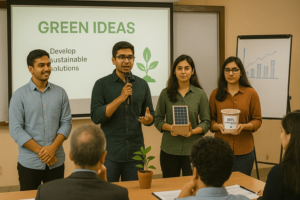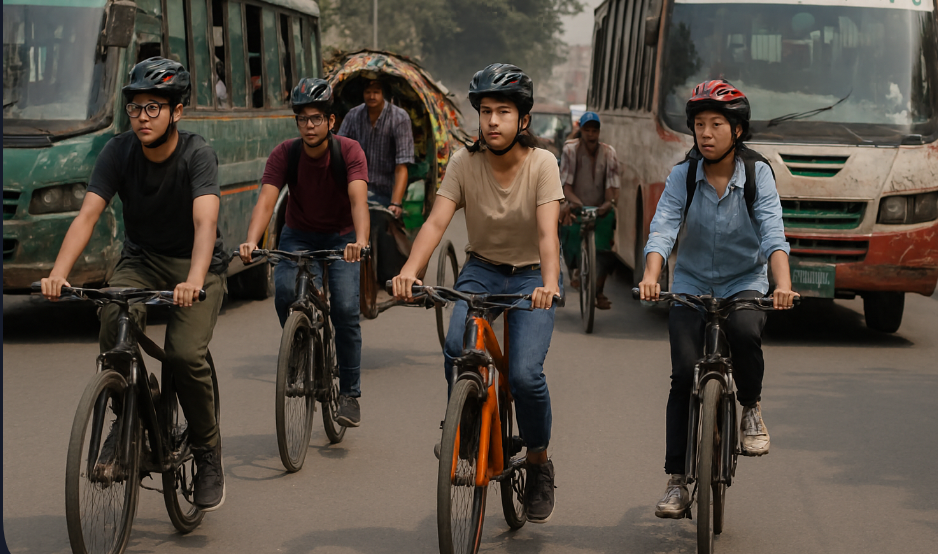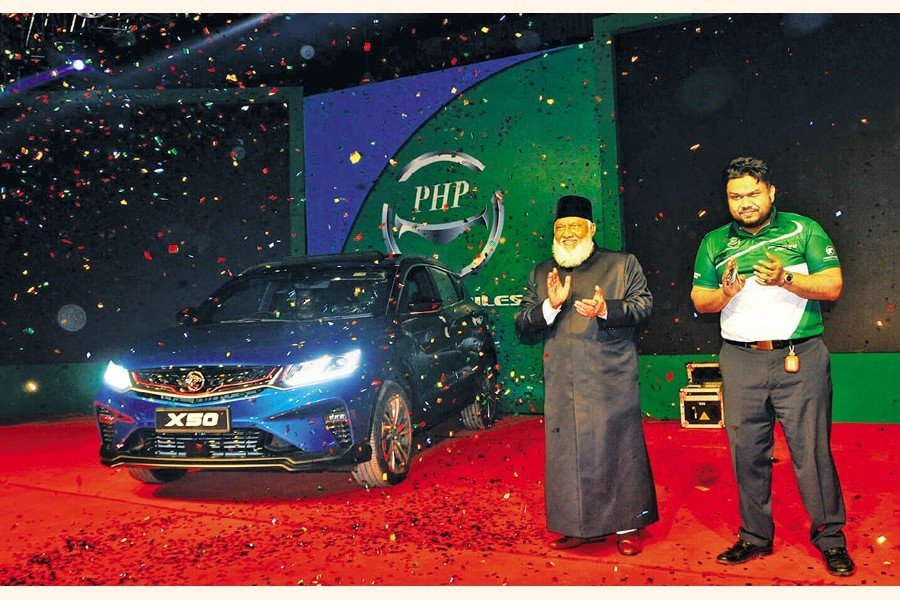The Rise of Green Startups in Bangladesh: A Youth-Driven Revolution
As Bangladesh faces the harsh realities of climate change—rising sea levels, increased flooding, and severe pollution—the need for sustainable development has never been more urgent. In this battle for survival and sustainability, a new wave of hope is emerging green startups led by the youth of Bangladesh. These innovative businesses are not only reducing the environmental footprint but also building a greener economy.
From recycling plastic to producing eco-friendly packaging and organic farming solutions, young Bangladeshis are pioneering eco-innovation through entrepreneurship. In this article, we explore the rise of green startups in Bangladesh, spotlight key youth-led ventures, and examine the social, economic, and environmental impacts of this inspiring movement.
The Environmental Context: Why Green Innovation Matters in Bangladesh
Bangladesh is highly vulnerable to climate change, frequently ranking among the most affected countries, according to the Global Climate Risk Index. Over the past two decades, extreme weather events, rising sea levels, and flooding have caused significant damage. Rapid urbanization, combined with industrial waste, plastic pollution, and deforestation, has exacerbated environmental challenges, threatening both public health and biodiversity. These escalating issues underscore the urgent need for sustainable solutions to safeguard the country’s future.
Key Environmental Challenges:
-
Air Pollution: Dhaka consistently ranks among the most polluted cities globally, with harmful levels of PM2.5 affecting public health.
-
Plastic Waste: The country produces over 3,000 tons of plastic waste every day, much of which ends up in rivers and landfills.
-
Deforestation & Biodiversity Loss: Rapid urban expansion and illegal logging are shrinking forests and threatening native wildlife.
-
Unregulated Industrial Emissions: Many factories operate without proper waste treatment, releasing toxic chemicals into the air and water.
Given these issues, green startups are not just businesses; they are essential responses to an ecological emergency.
Who Are These Green Entrepreneurs?
Bangladesh’s green startup movement is being fueled by young minds—primarily university students, fresh graduates, and socially aware individuals in their 20s and 30s. These youth entrepreneurs are driven not just by profit, but by purpose. Many are motivated by climate anxiety, frustration with environmental degradation, and a deep commitment to creating a better future.
They come from diverse academic backgrounds—engineering, environmental science, business, and design—and often start small, with campus projects or community initiatives that evolve into full-fledged startups.
Their ventures typically focus on:
-
Recycling & Waste Management: Innovating ways to collect, reuse, and upcycle plastic, e-waste, and household trash.
-
Renewable Energy: Creating affordable solar-powered solutions for rural areas and urban low-income communities.
-
Eco-Friendly Fashion: Promoting garments made from organic, recycled, or biodegradable materials to reduce fast fashion’s impact.
-
Sustainable Agriculture: Supporting chemical-free farming, vertical gardens, and farm-to-market models.
-
Green Tech & Digital Platforms: Using apps, websites, and IoT devices to raise awareness, monitor pollution, or offer green solutions at scale.

Notable Green Startups in Bangladesh
In the face of environmental degradation, a growing number of youth-led startups in Bangladesh are turning vision into impact. These green startups are tackling the country’s ecological challenges with creativity, compassion, and cutting-edge solutions. Here’s a closer look at some standout ventures and their contributions:
BD Recycle – Digitizing Plastic Waste Management
Founders: A group of engineering graduates
Focus: Plastic waste management and circular economy
BD Recycle Technologies Limited (BRTL) is a tech-based startup working to streamline plastic waste management in Bangladesh. Through their digital platform, they connect informal waste collectors, recycling dealers, and manufacturers, creating an end-to-end solution for collecting, sorting, and recycling plastic waste. Their model not only helps reduce environmental pollution but also integrates and supports the informal workforce that drives the sector.
Key Contributions:
-
Developed a digital platform that tracks and optimizes plastic waste collection and distribution.
-
Works with informal waste workers by facilitating access to collection routes and connecting them with bulk buyers.
-
Partners with manufacturers to supply recycled plastic materials, promoting circular production practices.
While specific recycling volumes and training numbers are not publicly verified, BRTL plays a crucial role in Bangladesh’s shift toward a structured, tech-driven circular economy.
EcoVia – Rethinking Plastic, One Package at a Time
Founders: Riasat Zaman, Rashik Hassan, and team
Focus: 100% compostable packaging from cotton-based apparel waste
Founded in 2020, EcoVia is a Bangladeshi clean-tech startup pioneering sustainable packaging solutions. Instead of relying on jute or cornstarch, EcoVia upcycles cotton-based textile waste from the country’s massive garment industry to produce biodegradable, toxin-free alternatives to plastic packaging. Their mission: reduce plastic pollution while addressing waste in the fashion industry.
Impact Highlights:
-
Their compostable mailers and takeaway bags decompose within 150–180 days in soil or composting conditions.
-
Partnered with businesses across retail, e-commerce, RMG, and hospitality—clients include Radisson Blu Dhaka and Fabrilife.
-
Converts fashion industry waste into value-added products, promoting a circular economy.
EcoVia’s work offers a compelling example of climate-conscious entrepreneurship—transforming a national waste challenge into scalable, planet-friendly innovation.
3. Harappa – Where Calendars Bloom into Trees
Founder: Sadika Rumon, writer and eco-innovator
Focus: Sustainable paper products and recycled fabric accessories
A truly poetic blend of culture and environmental consciousness, Harappa brings forgotten traditions and green ideas to life. Their standout product? A Bengali calendar made from seed paper—designed to grow into a plant when discarded.
Sadika was inspired by a fading memory: the Bengali calendars of her childhood. Today, her seed paper calendars combine functionality, nostalgia, and environmental awareness.
What makes it special:
-
Made from recycled paper, embedded with seeds such as basil, coriander, or marigold
-
Once discarded in soil, the pages sprout into plants, reminding users of nature’s magic
-
Raises awareness about the forgotten Bengali calendar months and how climate change is altering their seasonal traits
Harappa also produces bags from garment industry waste, offering a stylish and sustainable alternative to single-use plastics. Sadika’s aim isn’t profit—but reflection: “Even nature is now treated like private property,” she says. “My work is about reclaiming a relationship with nature—one handmade item at a time.”
University Incubators and Hackathons: Breeding Grounds for Eco-Innovation
Bangladeshi universities like BUET, IUT, and Dhaka University are emerging as hubs for eco-conscious innovation. These institutions host incubation centers, climate-focused clubs, and research labs that empower students to tackle environmental challenges through technology and entrepreneurship. BUET’s Innovation Lab regularly mentor’s student teams working on solar irrigation, green architecture, and low-cost pollution sensors. IUT’s Renewable Energy Club has collaborated with NGOs to prototype clean cookstoves and mini-grids for off-grid communities. Meanwhile, Dhaka University’s Centre for Entrepreneurship Development helps student-led startups gain seed funding and industry connections.
National events such as the Bangladesh Climate Hackathon, Greenovation Challenge, and Startup Bangladesh’s Social Impact Accelerator have become launchpads for youth-driven green solutions. From upcycled plastic construction panels to AI-based flood prediction tools, these hackathons and accelerators turn raw ideas into prototypes, while connecting participants with mentors, investors, and policymakers. Together, these university ecosystems are proving that young minds—when supported with the right tools—can engineer a more sustainable future for Bangladesh.
Government and NGO Support
In recent years, both the Bangladeshi government and leading NGOs have started to recognize the crucial role of eco-entrepreneurship in tackling climate challenges. Several initiatives have been launched to support green startups, particularly those led by youth.
The Startup Bangladesh iDEA Project, under the ICT Division, offers early-stage grants of up to BDT 10 lakh for promising startups, including those working on sustainability, clean energy, and waste management. This initiative also provides mentorship, networking opportunities, and access to co-working spaces.
The UNDP’s Youth Co:Lab, co-led with Citi Foundation, operates across the Asia-Pacific region and has extended its impact to Bangladesh. It focuses on nurturing socially and environmentally conscious young entrepreneurs through bootcamps, capacity-building workshops, and funding support.
BRAC’s Social Innovation Lab plays a significant role in helping green startups grow. By offering mentorship, pilot opportunities, and limited funding, BRAC connects grassroots innovators with its vast network of development projects and rural communities.
Despite these efforts, many young founders continue to face structural challenges such as bureaucratic delays, limited access to eco-friendly technology, and difficulty securing consistent long-term funding. Bridging these gaps remains essential to building a thriving green economy.

Impact Beyond Business: Eco Startups as Social Catalysts
Green startups in Bangladesh are not just building profitable ventures—they’re shaping a more sustainable society. By embedding environmental values into everyday practices, these businesses are influencing consumer behavior and fostering community-driven change.
For instance, some startups reward customers for bringing reusable bags, while others involve schoolchildren in recycling drives or organize local tree-planting events. These actions, though small, create ripple effects that build long-term environmental awareness.
Social Benefits at a Glance:
-
Youth Employment: Many green startups actively hire young people from underserved communities, especially in rural or semi-urban areas. Whether it’s waste collection, solar panel installation, or managing eco-friendly deliveries, these roles offer new livelihood options and skill-building.
-
Gender Empowerment: Women-led ventures in eco-fashion, organic skincare, and upcycled crafts are offering alternative career paths for women—often in areas where traditional employment options are limited. They challenge gender norms while promoting sustainable practices.
-
Eco-Education: These startups don’t stop at products—they also run awareness campaigns through Instagram, Facebook, community workshops, and school visits. By combining storytelling with environmental science, they make sustainability relatable to everyday life.
In essence, these ventures are catalysts for change, planting seeds of environmental consciousness alongside economic opportunity.

Challenges Facing Green Startups in Bangladesh
While eco-entrepreneurship is gaining momentum, green startups in Bangladesh still face an uphill battle. The promise of sustainability is often dampened by real-world limitations that make growth and impact difficult.
Key Challenges:
-
High Material Costs: Sustainable inputs like biodegradable packaging or organic ingredients are significantly more expensive than plastic or mass-produced alternatives. This drives up production costs and limits pricing flexibility.
-
Limited Access to Capital: Early-stage green ventures often struggle to secure funding. Traditional banks are hesitant to invest in unproven eco-business models, and angel investors or venture capital networks for green startups remain limited.
-
Consumer Habits: Many consumers still prioritize low cost and convenience over environmental benefits. This mindset makes it difficult for green businesses to compete without significant awareness efforts.
-
Regulatory Gaps: There is no clear policy framework or long-term incentives (such as tax breaks or green procurement policies) to support sustainable startups. Some businesses even face bureaucratic red tape that slows down approvals and licensing.
-
Greenwashing by Big Brands: Large corporations are increasingly using vague “eco-friendly” labels as marketing tools without genuine sustainability practices. This creates unfair competition and consumer confusion, making it harder for authentic startups to stand out.
These barriers underscore the urgent need for a more supportive ecosystem—through targeted policies, financing, and public education—to help green startups thrive and lead Bangladesh’s transition to a greener economy.
How Technology Is Enabling Eco-Innovation
Technology is at the heart of Bangladesh’s growing green startup ecosystem. From design to distribution, digital tools are helping eco-entrepreneurs become more efficient, transparent, and impactful. What once required significant infrastructure can now be streamlined through affordable tech.
Key Tech Enablers:
-
Artificial Intelligence (AI): Startups are piloting AI-driven waste sorting systems in urban recycling centers. These systems can quickly identify and separate recyclable materials, reducing labor costs and contamination.
-
Internet of Things (IoT): Solar energy startups use IoT-enabled sensors to monitor rooftop solar panels in real time. This helps detect faults, track energy output, and ensure long-term performance in remote areas without needing frequent manual checks.
-
Mobile Apps and E-Commerce: Eco-brands are leveraging mobile apps to engage consumers—offering features like carbon footprint calculators, refill reminders for reusable products, and direct access to sustainable goods via e-commerce.
-
Data Analytics: Some ventures use customer and supply chain data to reduce excess production and improve inventory forecasting, cutting down on resource waste.
The Future of Green Startups in Bangladesh
What’s on the Horizon?
-
Carbon Credit Markets: With rising interest in carbon offsetting, Bangladeshi startups working in reforestation, clean cookstoves, or renewable energy could soon tap into global carbon trading platforms. This could create new revenue streams while promoting environmental restoration.
-
Climate Finance and Impact Investing: Venture capital firms and angel investors are increasingly looking for startups that offer both financial returns and measurable environmental impact. Climate-focused funds—such as those supported by development partners—are beginning to prioritize South Asian green ventures, including those from Bangladesh.
-
Green Certification and Labelling: As eco-conscious consumers demand authenticity, startups offering genuinely sustainable products will benefit from independent verification. Certification programs could help weed out greenwashing and build consumer trust in locally made eco-products.
To reach full potential, however, this ecosystem needs stronger support: policy frameworks that incentivize green practices, funding pipelines tailored to sustainable ventures, and educational programs that inspire the next wave of green innovators.

How You Can Support the Movement
Whether you’re a consumer, policymaker, or aspiring entrepreneur, here are ways to boost green startups in Bangladesh:
-
Buy local, eco-friendly products
-
Support brands that disclose their environmental practices
-
Encourage schools and universities to offer green entrepreneurship programs
-
Lobby for green tax incentives and startup-friendly laws
-
Invest in or donate to sustainable ventures
Youth Power is Green Power
In a country like Bangladesh, where environmental issues and youth unemployment are both pressing concerns, green startups represent a powerful solution. They combine climate resilience, economic empowerment, and social change—all driven by the visionary energy of youth.
By fostering innovation and sustainability, these young entrepreneurs are not just building businesses—they are building a greener, fairer, and more hopeful future.








